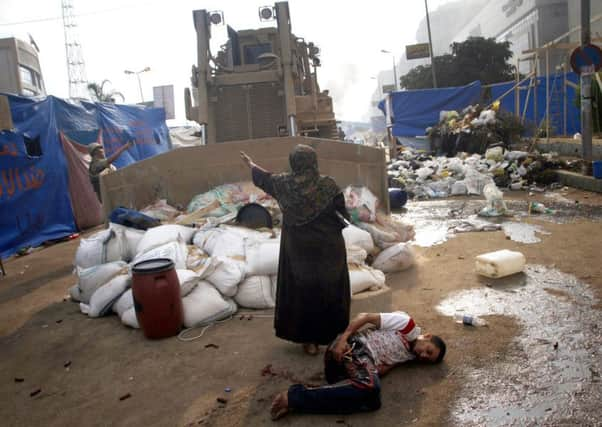Egypt is ‘guilty of Tiananmen Square’ backlash


In a 188-page report based on a year-long investigation, the New York-based group urged the United Nations to look into six incidents involving killings by the security forces of supporters of Islamist president Mohamed Morsi, who was overthrown by the army last July.
Egypt’s government responded yesterday to claim it was “characterised by negativity and bias” and relied on anonymous witnesses rather than neutral sources.
Advertisement
Hide AdAdvertisement
Hide AdHundreds of supporters of Morsi’s Muslim Brotherhood have been killed and thousands arrested since he was ousted.
The largest number of deaths came during the storming of two protest camps by security forces on 14 August, 2013.
The report said at least 817 protesters were killed during the clearing of the Brotherhood sit-in at Cairo’s Rabaa al-Adawiya.
HRW compared the attack to the 1989 massacre of protesters around China’s Tiananmen Square.
“In Rabaa Square, Egyptian security forces carried out one of the world’s largest killings of demonstrators in a single day in recent history,” HRW executive director Kenneth Roth said.
“This wasn’t merely a case of excessive force or poor training. It was a violent crackdown planned at the highest levels of the Egyptian government.
“Many of the same officials are still in power in Egypt, and have a lot to answer for.”
Egyptian officials have repeatedly said some protesters were armed and fired at police and soldiers. The interior ministry said 62 security officers died in violence across Egypt on 14 August. About 275 police have been killed over the past year, it said.
Advertisement
Hide AdAdvertisement
Hide AdBefore the dispersals, officials – including then army chief General Abdel Fattah al-Sisi, who is now president – had called for the sit-ins to be cleared, citing concern over traffic, public disturbances and possible violence.
HRW acknowledged that protesters threw rocks and petrol bombs at security forces and a few opened fire.
But that failed to justify the level of force deployed by the state, it said.
“Given the widespread and systematic nature of these killings, on political grounds, these most likely amount to crimes against humanity,” the report said.
HRW Middle East and North Africa director Sarah Leah Whitson said: “We showed the manner in which these [weapons] have been unlawfully used against citizens.”
The report called on the UN Human Rights Council to establish an international commission of inquiry to investigate “the mass killings of demonstrators since 30 June, 2013”. There was “every reason to believe” that “a security force that can get away with crimes of humanity” would do so again, Mr Roth said.
The report calls Mr Sisi a “principal architect” of the violence, as he was sitting at the top of the army’s chain of command.
The report also named interior minister Mohamed Ibrahim, saying his remarks on television two weeks after the dispersal show that instead of using force as a last resort, officials had estimated losing “10 per cent of the people” protesting.
Advertisement
Hide AdAdvertisement
Hide AdAn interior ministry statement about the events released at the weekend said that security forces cracked down only after efforts to persuade protesters to leave peacefully failed.
It said security forces issued a final warning to demonstrators before the assault and established “safe exits” for those who wanted to leave once police and soldiers moved in, but HRW said for most of the 12-hour assault there was no safe exit point.